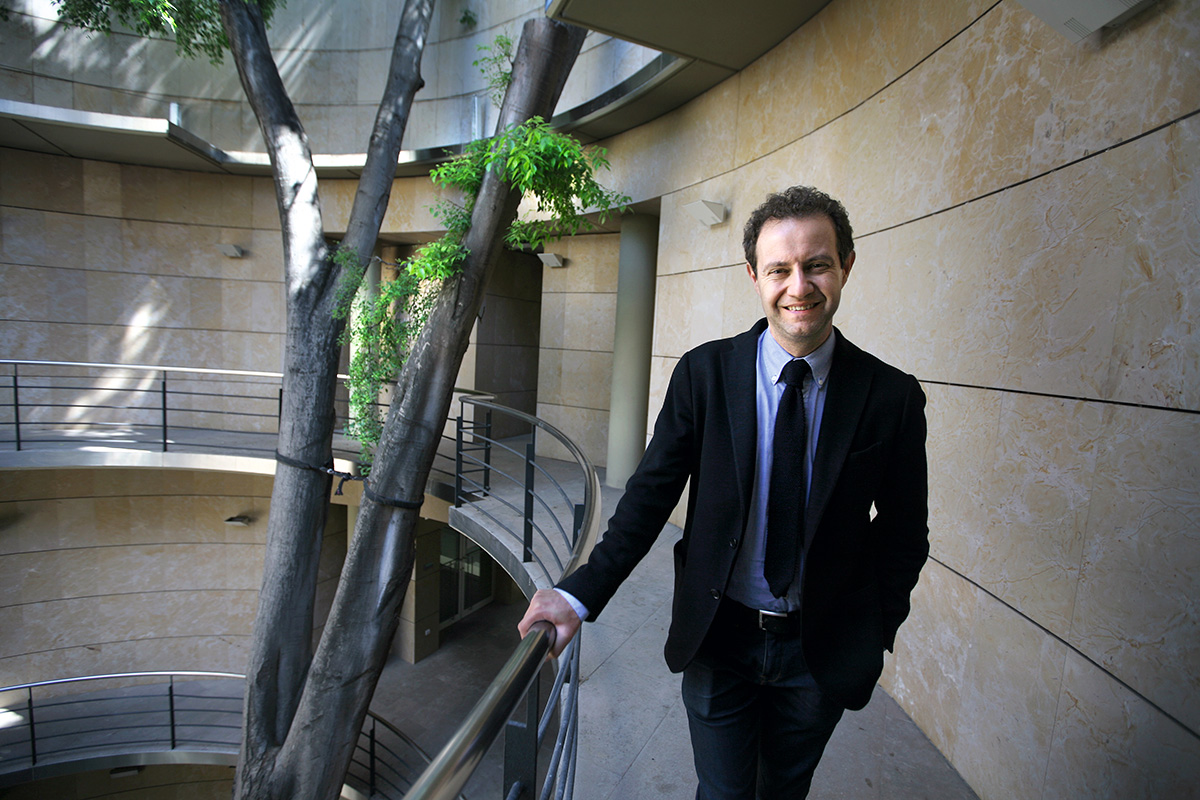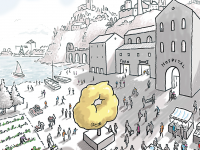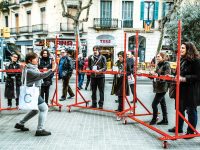Interview with Massimiano Bucchi
«Science is not a machine for solving practical problems»
Editor of Public Understanding of Science

Massimiano Bucchi is a professor of Sociology of Science at the University of Trento (Italy), and the current editor of the Public Understanding of Science (PUS) journal. His academic career represents the best exponent of contemporary trends in the field of science communication research. He has received numerous awards for his essays and books, including the Rai G. Mencucci Prize to best investigator on the media (1996 and 2000); the N. Mullins prize, the international prize of the Society of Social Studies of Science, to best essay in sociology of science (1997); and the Lelli Prize to the best doctoral thesis in sociology (1998). His book, Scegliere il mondo che vogliamo. Cittadini, politica, tecnoscienza (Il Mulino, 2006), received a special mention from the Merck-Serono prize jury (2007). Likewise, his book, Scientisti e antiscientisti: perché scienza e società non si capiscono, received the 2011 Calabria Prize in the science book section; and the book Il Pollo di Newton. La Scienza in Cucina received the Biblioteca la Vigna international prize in 2014. He is also the co-editor, with Brian Trench, of one of the most worldwide famous handbooks on science communication, entitled International handbook of public communication of science and technology (Routledge, 2008).
In May 2018, Massimiano Bucchi visited Valencia to attend several international academic events. Before concluding his stay, he delivered a lecture for the students of science journalism of the University of Valencia and gave this interview to Mètode.
«Science is part of the culture, and so it has to reflect also the diversity of culture, which is not a limitation, but a show of richness»
When Martin Bauer, your predecesor as PUS’s editor-in-chief, pointed out on his last editorial the relevance that the new editor was not Anglo-Saxon, he was foreseeing a lot of changes for this new period. Do you think that current research on science communication – not only in PUS, but in general – is becoming more inclusive than previous decades?
Yes, I think so. For example, in the new edition of the Handbook of public communication of science and technology that I edited with Brian Trench, which is a textbook for students, the last chapter is about science communication becoming a global enterprise. It is a chapter we wrote with colleagues from Africa, Latin America… So I think, certainly in the last twenty years, science communication has become a more global phenomenon. For example, the activities and investments have also increased outside of Europe and North-America, and I think the journal I am the editor of is now more global – also thanks to Martin [Bauer], who did great work – in the sense that we have more submissions from Latin America, Asia… We do not get that many from Africa still, but we receive some. Certainly the field has become more international. The interesting thing is not just the fact that science communication and science in social research are going global, but also that they are reflecting the diversity of regions, because it is not a question of exporting science communication models or strategies. One of the outcomes of research in the last years is that science is part of the culture, and so it has to reflect also the diversity of culture, which is not a limitation, but a show of richness.

© Jesús Císcar
Is there a set roadmap to get those people who usually remain out of reach for sicence communication?
This is an important point to address, because we have known for years that many science communication activities reach people who are already interested in science. We know that most people who go to science museums and science festivalsalready have an interest in science so, to some extent, science communication is preaching to the converted. So it would be interesting to know more about people who do not come to the science museum, who do not go to science festivals and do not read about science. Who are they? Why are they not interested? This is certainly one of the topics for further research. Because it is a different thing if you do not go to a science museum because it is too far, or too expensive, than if you do not go because you are not interested, or because you think science is too abstract or too far away from [what you know]. We need to do more research on this.

© Jesús Císcar
Do you think that people will understand in the future that they must pay for quality information?
It is always a hard question [talking about the future]. Will some trends like we see with digital media continue? Or is it a sort of speculative bubble that will at some point explode and people will go back to some of their usual behaviors? It is certainly a striking paradox of our time: people complain about fake news and the quality of the information on the web and social media, but on the other hand, nobody wants to pay two euros for a newspaper or a magazine, or ten euros for a book. This is one interesting contradiction. We are in a similar situation to somebody who is always eating at «all-you-can-eat» buffets, so quality does not seem to matter very much, and they suddenly expect Ferran Adrià or someone equivalent to cook something special for them. But the problem is if, at some point, they go to a Michelin restaurant, would they be able to tell the difference? Because quality is also a matter of taste. This is very interesting. In the Encyclopédie, the Enlightenment masterpiece, there is a very long entry about goût, taste, gusto. So goût or taste originally came not from food, but from art, so the taste is the ability to recognize what is good. I think this is one of the big challenges today: the user of information has much more responsibility because there are many more options, but it is much more difficult to decide what is relevant, what is trustworthy, what is good science communication because, before, somebody else would decide this for you, for better or for worse. So, if something was published on Mètode or La Vanguardia or BBC or The New York Times, by definition, it was interesting and trustworthy. But now, each one of us has a big responsibility to navigate through this very large web of informations of different quality and type, so I think this is one of the great challenges for science communication.
There is a debate on social networks about why science is not open to society. We publish papers, but people cannot access journals, and this is a fascinating paradox because it is essential to publish the best paper in the best journal, even though this journal is probably not open to the public.
«People complain about the quality of the information on the web, but nobody wants to pay two euros for a newspaper or a magazine»
Much more information is available to the general citizen that it ever was. However, the question is, first, what do we make with it? This is one of the questions for which we do not have an answer. For example, as a journal, we get more and more papers on Twitter or Facebook. Most of them count towards visualizations, retweets, this kind of things… Nevertheless, the question is what the people make with it. Is it entertainment? Is it just being part of the social discourse about something? For instance, when the Nobel Prize announcement takes place, or when everyone was so excited about the gravitational waves. Are people relating to the content in a more profound way? Of course, the logic of big companies like Google, Facebook, or Twitter is just to count the numbers because, for them, numbers are money. Of course, for science communication, numbers are not particularly interesting. However, this is not specific to the Internet. If you say «a hundred thousand people have come to our science festival», that is okay, but who were these people? What was the impact of the visit? Did they come just because it was something different to do, because they wanted to see in real life somebody they had seen on television? I think, in the next few years, [we need to ask these questions] to make sense of these changes.

© Jesús Císcar
Not long ago, Jürgen Habermas said that the objective of the Internet was «not explicitly the consumer’s attention, but the economic exploitation of the user’s private profile». As you said, this is a very important topic for research because you can count the number of retweets, but what do they mean?
To some extent, this is self-declared by Facebook and other companies: their mission is not to inform, but to profile people based on what they [share]. On the other hand, I think we should not think this is completely new to the Internet. I think, for example, of my father’s generation: going in the morning and buying a newspaper was an automatic behavior, like going to the bar and ordering coffee, something you do every morning. And the reason you do this is not strictly to have information, but to be part of your society. An important part of our relationship with communication – it can be news, movies – is not only to absorb the content. This is a very functionalist, rationalist approach that I think has misguided also Public Understanding of Science. It is also about talking to our friends and networks. Because if you did not know the latest news, or if you did not see that one movie at the time, you did not have a common language with your friends. I think this is still happening. Of course, the difference now is that if the social media fulfil this need and through them, more or less, you know what other people are talking about, you do not need a newspaper, you do not watch television. This, of course, can have consequences, because we know that the attention or information cycle is very short, and now it is even shorter than it was with television and newspapers. We should not forget that traditional media, as well as digital media, are not about education. Of course, we know that there have been movies that had consequences for the public perception of certain issues, like The Chinese syndrome or The day after. But there is a classic theory in the media, the theory of uses and gratification, which means people use the media for different things, and one important reason is to be part of the social conversation. However, as I said, when it comes to science communication, it would be interesting to know how this works.
«The mission of Facebook and other companies is not to inform, but to profile people based on what they share»
In Spain, pseudotherapies are usually chosen by people with high-level education and who are very well informed. I do not know if this is the case also in Italy…
The same goes for vaccination in Italy. They are rather few, but in most of the cases, they are people who have the information. They are highly educated, but they think they know more than the doctor does. This might be an indirect effect of information being so accessible: people feel that they are more competent just because they can quickly reach the information. However, of course, as in the case of open access, accessing the content does not mean you can understand it or put it into context. Because information is also about context.
«To some extent, science communication is preaching to the converted»
Speaking about citizen engagement with science and technology, what happens when citizens empower themselves and request specific lines of research? I am thinking, for instance, about parents with children who have a rare disease, who do not understand why investment goes to space exploration instead of the search for new treatments.

© Jesús Císcar
That is a special type of citizen engagement, like when environmental groups have been active in discovering risks that traditional experts had neglected. Of course, it is important to empathize with those who are living a very dramatic situation. On the other hand, I think it can be a dangerous misunderstanding to consider science as a machine for solving practical problems, or like a supermarket. This helps us to understand why people in some cases develop negative attitudes. For example, European policies are all about innovation, and how we have to invest in science. Why? Just for one reason: because it will bring innovation, economy, progress, money… Alternatively, practical results, like in medicine. Citizens usually tend to consider science like this, but then they want it to solve their problems. And, in my view, this is potentially very dangerous, because science is also part of the culture. It is not necessarily for one practical purpose. We know that sometimes it takes decades: think about gravity waves. For many years, physicists thought they did not exist, so if one reasoned very practically, all the funding to that search would have stopped many years ago. Many fields have given interesting development after many, many years, and failures. So we need to have a broad vision of the role of science in contemporary society and culture and not just as a supermarket, where you go, and if it does not give you the answer that you want, then you dump it for something else. This is also why I am a bit skeptical about these fashionable formats like FameLab, because, of course, science is very interesting for many things, but it is also something that takes years of study and patience. To convey the idea that some science is quick can actually mean miseducating young generations. They think that it is a little bit like magic: you push a button, and the answer comes. I think socially and politically, from the human point of view, we have to be empathetic for the people, but on the other hand, I think we have to be careful. Unfortunately, at least at the European policy level, this is the concept: to present science as a solution to our practical problems, when it is not.

© Jesús Císcar
The last question is about the current state and the future of science communication: what is your perspective for the next decade?
I think regarding science and society we have many interesting questions to ask. One I already mentioned: what are people doing with all this content, with all this sharing. Another is about the disengage, and the people who are normally left out science communication. I think we have a more and more diverse audiences and we should always remember to talk about the «publics» of science. Then there is the question of regional diversity, and recognizing the diversity of styles in science communication. There are many open questions and this was one of the reasons for starting this new program [the Master in Communication of Science and Innovation in the University of Trento]. We are seeing big changes also in terms of occupation: science communication is moving away from the media – where there is no money, unfortunately, and no jobs anymore, at least for the next years – towards research organizations. So, this is why we are launching this master, to train people to work in places like a university or science museum. However, we do not want to teach them the techniques of communication exclusively, but to develop an understanding of science in society. For me, the new science communicators have to be able to work at the interface of three worlds, not just two: on the one hand, the world of research and innovation; on the other, society – and to be able to listen to it – and the media, including digital media. They should be able to develop a comprehensive vision of science communication, not just to execute one task like writing, but, for example, to decide what the most appropriate initiative is to talk to the public about a topic. This is what we are missing in most universities: most have a press office, but they are still part of that old approach according to which you convince the media to talk about your university research, and then your work is done: people will read about it in the newspaper or see it on television. However, nowadays it is much more complex and much more interesting, because you have a variety [of options to communicate]: you can do a video-abstract with your research, a game about the research, an event… The important thing is to do something that makes sense for your audience and your goals and is respectful of the public and their expectations.
1. Science monologue programme today working in over thirty countries, including Spain. (Go back)





